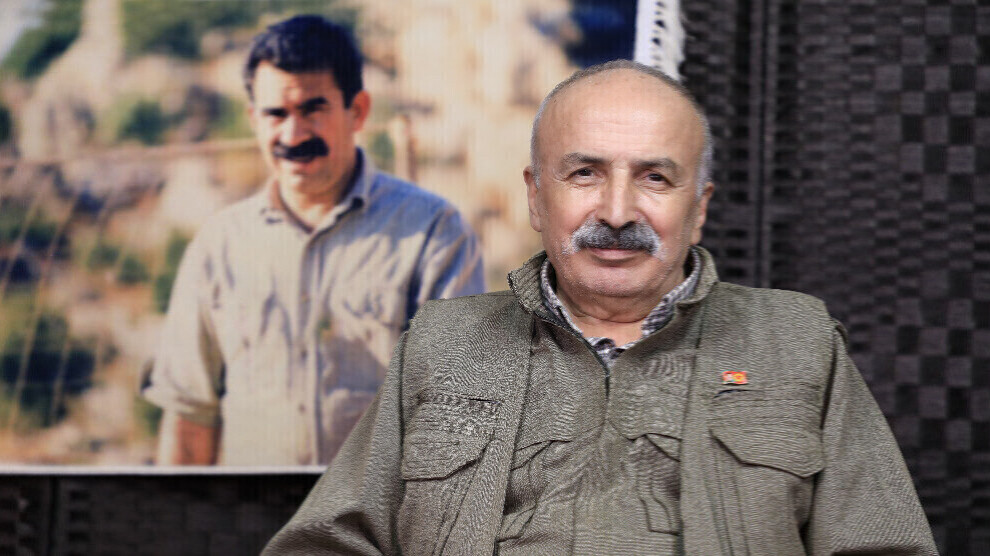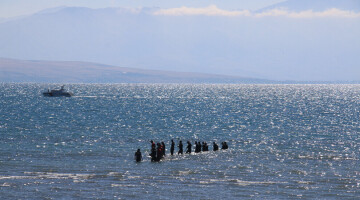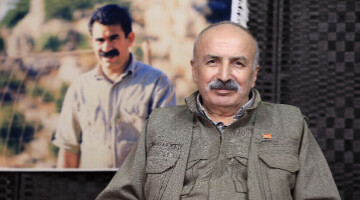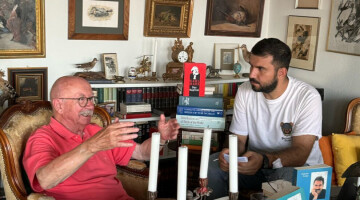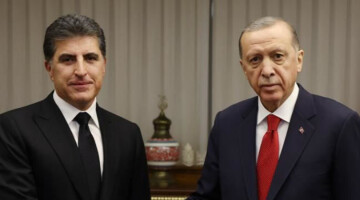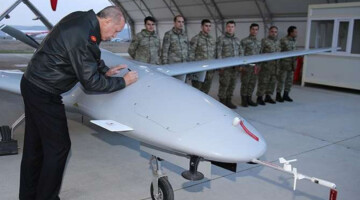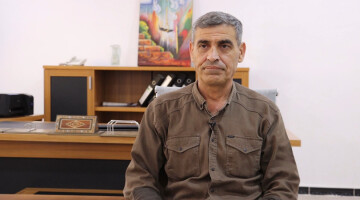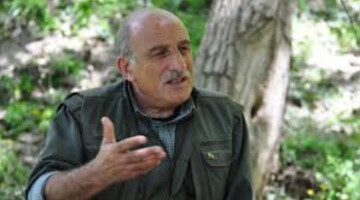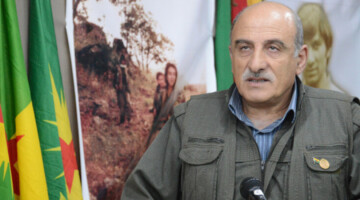In an extensive interview with ANF, Mustafa Karasu, member of the KCK (Kurdistan Communities Union) Executive Council, talked in detail about the domestic political situation in Turkey, explaining the significance of Bahceli's handshake and the artificial discussions about a possible solution process and elaborating on the steps now required of the democratic forces.
Below we publish the second part of the in-depth interview, the first part of which can be read here.
You repeatedly analyze that because it cannot achieve any results on the battlefield, the Turkish state is increasing the repression and persecution of Kurdish society, which is also leading to a decay in Turkish society. The number of rapes and murders of women and children continues to rise, while corruption and poverty continue to spread and push people to their limits. The opposition in Turkey blames the economy for this. Is this the right analysis? Can solutions be achieved through what the opposition is trying to put on the agenda?
The Turkish state is waging a war to suppress the Kurdish people’s struggle for freedom. It is waging this war in the dirtiest way, as a special warfare. In the early 1990s, special warfare was launched in order to suppress the Kurdish freedom struggle by using all kinds of dirty methods. Thousands of villages were burned down, 17 thousand political murders, referred to as ‘unsolved murders’, were committed, and tens of thousands of people were tortured and imprisoned. The pioneers of this period of dirty war were Tansu Ciller, Dogan Güresh, and Mehmet Agar. At that time, enmity against Kurds, the PKK, and Rêber Apo (Leader Abdullah Öcalan) was rampant. In those years, a concept emerged that whoever was hostile to Rêber Apo, the PKK, and the Kurds gained economic benefits and political and social prestige. Kurdish enmity, chauvinism, and nationalism were provoked to such an extent that society was unable to think normally. This chauvinism and Kurdish hostility had left no moral and conscientious values in Turkish society. People of culture and art, the creators of goodness, beauty, morality, conscience, and justice, were also heavily polluted. We still remember how Ahmet Kaya, who was well known in Turkish society, was attacked when he said that he would include Kurdish songs in his upcoming cassette. This situation of people of culture and arts was clear evidence of the level of decay and degeneration. Rêber Apo emphasized that both the state and society in Turkey decayed in the 1990s.
A big part of the war against the Kurdish freedom movement has always been the special warfare, and the military warfare has mainly been considered as a means to bring it to a conclusion. Undoubtedly, especially since 2015, the military war and the special war have gone hand in hand. Since March 2015, when Erdogan ignored the Dolmabahce Agreement and imposed severe isolation on April 5, 2015, the most intense special war in Turkey’s history has been put into effect. With the AKP’s alliance with the MHP after the June 7, 2015 elections, this special war has been waged unbridled. While Hizbulkontra was used in the 1990s, ISIS has been used since 2014. Kurdish hostility has been taken to a much higher level than in the 1990s.
The war, which was waged with cruder and a handful of methods in the 1990s, continued after 2015 with several times more dirty methods. They wanted to take away the Kurds’ breathing space everywhere. As the war escalated, dozens of politicians were arrested on a daily basis. MPs, co-mayors of municipalities, and provincial and district executives of political parties have been arrested. An example of this cannot be found anywhere else in the world. Back then, Suleyman Soylu said, ‘The PKK is a women’s party,’ and so their terror was unleashed on female politicians and members of women’s organizations; thousands were detained, and women were imprisoned at a rate not seen in any country in the world. A dirty war policy was also waged on the youth. In order to prevent Kurdish youth and women from becoming politicized, drugs and prostitution were popularized as an attack within their concept of special war. Again, sports, especially football, were also used for this purpose. Even making the team favored by Kurdish youth the champion in the Super League has been used as a special war method in this direction. Art and culture in Turkey have also been manipulated to incite militarist, chauvinist, and nationalist sentiments. Attempts have been made to create a historical consciousness that ignores different identities and beliefs. Kurds have been living together with all the other peoples of Turkey for millennia. However, the Kurds, with whom they have lived for millennia, have been seen as enemies for defending their identity, language, and culture. The Kurds, with whom they live intertwined in the metropolises of Turkey, are seen as enemies. Kurds have been attacked for speaking Kurdish and singing Kurdish songs. Crimes against Kurds were considered normal and not punished. An attack of chauvinism and nationalism has been escalated against the Kurds. Can there be morality and conscience in a society that looks at its neighbors and those it has lived with for a thousand years in such a way?
Kurdish hostility and the use of all kinds of dirty methods against the Kurdish freedom movement have made the whole society a part of the dirty war. Many people, even among civilians, have seen themselves as militants of this war. The AKP-MHP government has created such an understanding of duty in society. Enmity against the Kurdish people and the freedom struggle have been brought to such a level that even those who do not approach the Kurds in the same way as the AKP-MHP have been marginalized. They are labeled as traitors and PKK supporters. In every speech, Tayyip Erdogan and Devlet Bahceli have attacked and insulted those who do not follow them, thus creating an unprecedented polarization in society. Even the AKP’s base was disturbed by this polarization. This is one of the main reasons why the AKP’s votes have been steadily declining and why they lost in the last local elections.
Nationalism and chauvinism, whose language, style, and method is that of violence, have rotted society. Its mentality is patriarchal. In a country where such polarization is created, everyone looks at each other with suspicion and is ready to use violence. If there is so much violence in society, so many rapes of women, rapes, and violence against children, it is the policies of the AKP-MHP government, especially over the last ten years, that have created this. This is in the MHP’s genes, and the AKP has become completely MHP-ized. Its language, style, and policies have created a society that sees others as enemies and is prone to violence. Since the AKP and MHP have no tolerance for political forces and politicians other than themselves, this is how society has been shaped. If violence, gangs, violence against women, and rape have increased in Turkish society, it is not because of economic problems. Maybe at most ten percent of such attacks stem from the background of economic problems. It is the government policies, state administration, and prevailing political mentality that create these problems. Wherever chauvinism and nationalism are incited at this level, the tendency towards violence increases. Many films and TV series in recent years have also been militarizing society.
A democratic political solution to the Kurdish question is necessary for the solution of all problems in Turkey. It is also necessary to solve the Kurdish question in order to calm down this social mood in Turkey and to prevent decay, corruption, and violence. The special war against the Kurds is rotting society. The war against the Kurds is so unjust and contradicts human values that it is not possible to wage this war according to normal laws and regulations. For this reason, in the dirty war against the Kurds, they obey neither their own constitution nor their own laws. Even their fascist-spirited constitution and laws do not allow them to wage this dirty war. Those who do not see the source of the problems in Turkey as the dirty special war being waged on the Kurds either close their eyes to this war or are indirect partners in it. The real democrats and politicians of Turkey must recognize this reality and wage a struggle in this regard.
The CHP emerged as the leading party in the municipal elections and created an expectation in society. What impact do you think its subsequent policies have had on Turkish politics since then?
The reason why the CHP emerged as the leading party in the municipal elections is the reaction of the people against the policies pursued by the AKP-MHP government for ten years. The discontent created by the AKP-MHP alliance rather than the policies pursued by the CHP led to this result. The anti-Kurdish policies of the AKP-MHP government after 2015 were also effective in this result.
After Kurdistan, Kurds are concentrated in the Marmara, Cukurova, Aegean, and Mediterranean regions. These are also the areas that determine the economic, social, cultural, and political direction of Turkey. The Kurds have become a social force that influences political developments in these areas. The position of the Kurds in these areas is at a level to play an important role in the democratization of Turkey and the solution of the Kurdish question. What made the CHP the leading party was the high number of votes it received in these areas. The democratic forces, including the Kurds, expected the CHP to recognize this reality and show an attitude in line with democratization. Any political power that does not produce policies in line with the solution of the Kurdish question cannot be democratic. It cannot claim to be democratic.
The CHP has focused on economic problems to tangent Turkey’s main social and political problems. Undoubtedly, there is a serious economic problem in Turkey. Except for a certain rich and upper middle class, there is serious poverty in Turkey. It is understandable that the CHP is interested in this problem, but it is the war policies that have created this economic problem. Kurdish hostility turns governments into war governments. As a matter of fact, Tayyip Erdogan asked the people raising their voices against the poverty, “Do you even know the price of one bullet?” Most of the bombs they let rain down on the mountains are bought from abroad, and there are many other huge war expenditures. They are feeding tens of thousands of mercenaries and gangs; huge resources are transferred to special warfare. Then there are also the bribes that are given to many sectors, individuals, and foreign governments. In short, the war against the Kurds is creating the economic problems. The CHP does not see the root cause of the economic problems.
A significant part of society’s reaction to AKP-MHP stems from social problems created by injustice, polarization, and partisanship. Society expects the CHP to take steps towards democratization. But the CHP has not taken any steps in this regard except for some rhetorical ones. It has not developed a policy on the Kurdish issue. For example, it could have established a commission in the parliament for the solution of the Kurdish question and for the parliament to deal with this. Can a parliament that will not take part in such an important issue claim to solve Turkey’s problems?
On the other hand, instead of fighting against the AKP-MHP policies that the society is rejecting, it is conducting a policy that normalizes their 20-year-old policies. With the so-called normalization policy, the CHP gave the AKP-MHP government a breathing space and normalized Erdogan, who has spilled so much blood of the peoples of Turkey through at the years, polarized society, normalized injustice, turned the judiciary into a militant organ of the policies he pursues, and established a complete despotic system. The political style of Turkish politics has neither normalized nor democratized; the 9-year policies of Erdogan and the AKP-MHP government have been normalized. Instead of 9 years of practices being held to account, these practices have been softened and made acceptable. The new CHP leadership has done exactly what Erdogan wanted. As a matter of fact, Erdogan has recovered from the shock of his electoral defeat and started to take initiative again.
Undoubtedly, it is understandable that the CHP wants to appeal to the AKP’s base and win it for itself. If it is to remain Turkey’s leading party, such a policy is to be expected. If the CHP is not going to remain in its old mold, it is understandable that it appeals to the AKP’s base. This cannot be done by normalizing Erdogan’s policies and practices. It can achieve this goal solely with the right policies and discourse. The CHP did not win over the AKP’s base through normalization; on the contrary, it helped Erdogan retain this base.
In short, the CHP failed to respond to the expectations of society. Democratization can only come through a struggle against undemocratic policies and practices. Otherwise, democratization does not come by begging Erdogan to do one or two steps. With its ideological and political approaches, the CHP has not been in a stance and effort to play a role in democratizing Turkey.
The role of the democratic and leftist circles in Turkey and Kurdistan, which can be defined as the real opposition, is very important. While the AKP-MHP fascism is increasing oppression and persecution, are democrats, left-socialists, and the oppressed as a whole able to raise the struggle against it at the same rate?
It is obvious that the organization and struggle of the Kurdish democratic forces and the Turkish democratic political forces and the left will be decisive for the democratization of Turkey. The level of democratization of Turkey on the basis of the solution of the Kurdish question will be determined by the radical democratic forces, especially the left and democratic forces. The quality and level of the discourse and steps taken by the political forces within the system in the direction of democratization will also depend on the organized power and struggle of the radical democratic forces. It would be a mistake to expect significant democratization steps from the CHP or any other political force within the system that will ensure the solution of the Kurdish question. In Turkey, there have been defined borders and an ideological and political understanding for a hundred years. Although there is a tendency and effort to go beyond these boundaries in some areas according to the economic, social, cultural, and political developments in Turkey, there is still no political party or force that can overcome these ideological and political barriers and democratize Turkey in the real sense. Of course, some leftist forces, especially the socialists, have taken important steps in overcoming these ideological and political barriers. After September 12, the leftist forces, whose power was scaled back, are still struggling to recover and become stronger.
Undoubtedly, the Kurdish freedom movement and the Kurdish democratic political forces have played an important role in the survival and recovery of the left and democratic forces of Turkey. However, the radical democratic forces are still far away from having the desired impact because they have not yet achieved a common program on democratization and a common struggle on this basis. However, left democrats in Turkey have a strong tradition and legacy of struggle. If they could form a common platform of struggle, they could determine the political developments in Turkey. The democratic political power of the Kurdish people is at a level to play an important role in ensuring the emergence of such a force of struggle. Since its emergence on the stage of history, the Kurdish freedom movement has been working for a joint struggle with the real democratic forces of Turkey. Our movement believes that this is how Turkey can and will be democratized.
I want to emphasize once again that the democratic forces of Turkey cannot play their role without joint struggle with the democratic forces of the Kurdish people. Likewise, the Kurdish democratic forces cannot achieve democratization on the basis of the solution of the Kurdish question without being in alliance and joint struggle with the democratic forces of Turkey in the current conjuncture. It is this joint struggle that will mobilize the other political forces of Turkey towards democratization.
This alliance and partnership must essentially be based on a joint struggle. Undoubtedly, since the elections are also part of the struggle for democratization, it is important to enter the elections jointly. There are efforts on the Turkish and Kurdish fronts to negate alliances. These are wrong and shallow views; superficial approaches. Some emotional and reactionary attitudes. Those who do not want the Kurdish democracy forces and the democracy forces of Turkey to cooperate are anti-democratic. Those who do not want a solution to the Kurdish question, the Turkish state, the ruling forces, and intelligence organs are trying to create such perceptions. They know that a joint struggle will strengthen the Kurdish struggle and frustrate the genocide policies. That is why they want to isolate the Kurds. Opposing alliance policies because of some mistakes and shortcomings weakens the political power of the Kurds and harms the struggle of the Kurdish people.
At the opening of the Turkish Parliament, MHP President Devlet Bahceli shook hands with DEM Party deputies, which raised a debate on whether there could be a new solution process. How do you evaluate this situation?
Why did the MHP leader, who is an enemy of the Kurds and in fact has no other policy and goal than the genocide of Kurds and turning Kurdistan into an expansion area for Turkish nationhood, shake hands with DEM Party members? It is known what Devlet Bahceli has said about Kurdish democratic politics, including the DEM Party. Then why did he shake hands? Devlet Bahceli explained his own reasons for the handshake. It is clear that this justification is not correct. Before the opening of parliament, Tayyip Erdogan visited Bahceli at his home. The handshake and the new policy, or rather the new game against the DEM Party, were decided during this meeting. Most probably Erdogan planned this game and got Devlet Bahceli to accept it. Since Erdogan knew Bahceli and the MHP well, he made a proposal that Bahceli would accept. We can say that this is a plan that the MHP line will gladly accept. Besê Hozat, our co-presidency of the KCK Executive Council, considered this a new game setting because of the character, policy, and practices of the AKP-MHP government and the genocide policies they still insist on.
Immediately after this handshake, some circles started to spread that “The People’s Alliance is starting a new solution process with the DEM Party.” First of all, I want to underline that there was no real solution process between 2007 and 2015. Rêber Apo had a policy and efforts to bring the AKP government into a solution process. All of Rêber Apo’s speeches, messages, the documents he presented, and most recently the Dolmabahce Agreement, which was presented on February 28, 2015, in Dolmabahce with members of the government in a live broadcast on all TV channels, were also for this purpose. A close examination of the Dolmabahce Agreement reveals this reality. This agreement was presented to us before it was published. As the administration, we suggested that two more concrete articles be added. When these suggestions were made, Rêber Apo said, “What was put in the agreement is sufficient.” Unbeknownst to some, the statements that Rêber Apo criticized this agreement and found it insufficient are untrue. Rêber Apo wanted to bring the AKP government and the state into the solution process with this agreement. However, he rejected this agreement because Erdogan and the state officials he was in contact with did not have an understanding of resolution. In fact, the Turkish National Security Council in October 2014 decided on the “collapse plan” (Plan that the Turkish government, or rather the deep state of Turkey in coordination with NATO forces, forged secretly during the so-called ‘peace process’. The state abruptly broke off talks with the Kurdish movement in 2015 and escalated the situation as part of this plan, which could literally be translated as a ‘plan of forcing them to their knees’.) For some to say that “the PKK brought the process to an end” is a total lie and contrary to reality.
Both Rêber Apo and our movement were in favor of a reasonable solution. For this reason, Rêber Apo and our movement used very careful language and approach. Rêber Apo acted with the approach of encouraging both the government, the state, and the public opinion for a solution process. Undoubtedly, our movement, Kurdish democratic politics, and the real democratic forces of Turkey have always been in favor of a reasonable democratic political solution to the Kurdish question. It engages with every political force that wants such a solution. Above all, this is an important and indispensable step for the democratization of Turkey. Considering the reality of Turkey and its century-old policies, only those with a democratic mindset can take this step. In Turkey, it is not possible to take a step towards solving the Kurdish question and at the same time have a democratic mentality. In the reality of Turkey, such a situation is out of the question.
AKP came to power in 2002 with some democratic discourses. Since Islamic circles had been subjected to some oppression in the past, there were some democratic-minded people among them. It is important to know that the process that brought AKP to power started with the military coup of September 12. In order to completely liquidate the Kurdish people’s demands for freedom and to isolate and encircle the Kurds for this purpose, it was decided to bring political Islam into the state. In other words, they were brought into the system to be on the side of the state policy in completing the Kurdish genocide. This policy should not be forgotten when evaluating the AKP and political Islam. In the process of bringing AKP and political Islam into the state, there were objections and resistance. Therefore, the AKP government found it necessary to appeal to the people’s aspirations for democracy in order to overcome such obstacles. It also gave soft messages to the Kurds. Moreover, since it had the problem of being fully entrenched in the state and since a violent confrontation with the Kurdish freedom movement would weaken it as a government, it asked for a ceasefire from our movement through various intermediaries. Although Rêber Apo did not find the timing right, he accepted this situation in order to bring the government and the state into a solution process. He made a great effort in this regard. However, since Erdogan and the AKP government did not inspire confidence, in this process he mainly focused on strengthening all democratic forces in Turkey, including the Kurdish democratic forces. He presented projects to bring the Kurdish democratic forces and the democratic forces of Turkey into alliance and joint struggle. He also made important developments in this regard. Rêber Apo’s suspicions were confirmed. Erdogan rejected the Dolmabahce Agreement, which would have been an important step for the solution process. Rejecting this agreement meant declaring war on the Kurdish freedom movement and all democratic forces. The “collapse plan” had already been prepared in the summer of 2014. The Dolmabahce Agreement was rejected within this framework. Since then, the dirty war waged in Kurdistan and the attacks against the democratic forces are known.
So, it seems hard to believe that the AKP-MHP government, which has waged a 9-year dirty genocide war, will develop a solution process. What is currently being suggested through some channels would mean that the MHP has suddenly thrown all policies and goals, especially the genocide against the Kurds, overboard and is pursuing a completely new policy. Are there any serious signs, however small, of such a radical change?
Can there be anything as good and beautiful for Turkey as a solution to the Kurdish question? Of course, we and the Kurdish democratic movement have always expressed that we are in favor of a democratic solution. The fact that some opposition channels are discussing the solution process as if it were a bad thing cannot be explained by any logic. Discussing the solution process as if it is something negative without discussing the backstory is understood by the Kurdish people and democracy forces as anti-Kurdish and anti-democratic. The discussion of the channels that call themselves opposition should say that the Kurdish question must be solved as a necessary requirement for the democratization of Turkey, but the MHP and AKP mentality cannot solve this problem. If they want to solve the Kurdish question and make peace with the Kurds, then they should put forward the steps they will take to solve it. If they want to unmask the game set up by the MHP and AKP, they should do it. The Kurds should point out that the current policies are obvious and that they will not be part of this game. They can say that the AKP-MHP government has set up such a game in order to prevent the Kurds from struggling, to confuse some Kurds in order to carry out the Kurdish genocide policy more easily, and to weaken the Kurdish people’s struggle for freedom by telling them to oppose the PKK. Unless they see clear steps and policy changes, they should take that stance. The law is being violated in Imrali, severe isolation is being practiced, the prisons have become houses of death, thousands of politicians are in prison, and there are daily arrests and repression on Kurdish culture. Until these situations change, there can be no sincere intention to solve the Kurdish question.
Kurds can take such an attitude. However, if the opposition debates on the negativity of the solution process, this would not be a democratic understanding; it would be an undemocratic attitude. In fact, it would be an endorsement of the AKP-MHP government’s policies so far. In fact, it is important what attitude will be taken in this process. It will also reveal the direction of the CHP’s policies will be. The CHP could openly take the initiative by saying, “If there is a solution to the Kurdish question, we will support it.” It would put the CHP on the real democratic line. In this way, they will no longer be able to accuse the CHP by saying, “You are on the side of separatists; you are on the side of this and that.” Contrary to the approach put forward by some in the opposition channels, the CHP itself can take the initiative in solving the Kurdish question. In this way, it would frustrate the AKP-MHP policy of blaming the opposition and stalling the Kurds. The biggest obstacle to the CHP becoming a real social democratic party is the accusatory and blaming approach of the MHP-AKP and some circles that prevent the CHP from developing policies on the Kurdish issue. The CHP can overcome this situation and become a real social democratic party by taking advantage of the messages given by the AKP-MHP to the DEM Party. If it fails to overcome the fact that some people in its opposition channels are turning the resolution of the Kurdish issue into a negative debate, the CHP will lose the image it had during the municipal elections and will thus fall into the game set up by the AKP-MHP. Another important reason for the MHP and AKP’s instrumentalization of the Kurdish question is the lack of a real democratic or social democratic stance and program in Turkey. As is well known, everywhere in the world, leftist forces and those who call themselves social democrats take a positive approach to such problems.
The Turkish state has generally waged a special war against the Kurds. The AKP-MHP alliance is the culmination of this special and dirty war against the Kurds. Nothing positive can be expected from the AKP-MHP government on behalf of the Kurds. The MHP cannot be compared with nationalist and fascist parties in other countries of the world. Fascist parties in other countries have other goals and programs. The MHP has only one goal: to end the Kurds. It would be a great blunder not to look at every discourse and step associated with the MHP within this framework.
The AKP-MHP fascist alliance has set a trap for the DEM Party and the democratic political space. They will make calls; they will impose things that the DEM Party cannot accept. And when the DEM Party and democratic forces do not do what they say, they will increase their attacks even more by saying, “We reached out to the DEM Party; we opened space; we offered opportunities; we gave them the chance to make politics, but they did not respond.” This seems to be the game they have set up. As a matter of fact, in response to a journalist’s question, “What steps can be taken for this process?” Erdogan said, “You give your answer.” When the journalist replied, “This process will continue without taking any steps,” Erdogan said, “Right,” and confirmed the journalist. This is what they are really thinking. Of course, the Kurdish democratic forces should say, “We are ready for a solution, but do this and that, especially the lifting of the isolation in Imrali; we are already a party of Turkey; we want Turkey to be democratized by solving the Kurdish question.” Undoubtedly, as long as these steps are not taken, they should continue their attitude and struggle against the AKP-MHP government. Thus, they must expose this game set up by the AKP-MHP.
It is also important to point out one thing here that reveals what kind of a party the MHP is. The day before, Devlet Bahceli had made all kinds of insults against the CHP and Ozgur Ozel, and at the opening of the Parliament he said to Ozgur Ozel, “What we said is a matter of politics, don’t take offense”. This is the reality of politics in Turkey. This is the most basic characteristic of the special war; that is to deceive the public. What they say openly is to deceive the people. However, the reality is that they are pursuing a different policy. How such a thing can be said is really incomprehensible. Devlet Bahceli, in his own person, has revealed what a Turkish politician is. A politics that deceives the people is being carried out. This statement alone is enough to end the political life of a politician. Whoever says this should never appear in front of the public again. In this respect, Devlet Bahceli’s handshake is also in line with the politics of special war. Trying to make something out of Devlet Bahceli’s handshake and his rhetoric is to fail to understand the reality of the Turkish state, especially the Kurdish genocide policy, which is the fundamental policy of the Turkish state and which is still being carried out.

